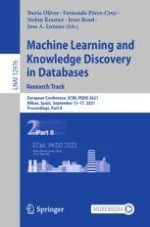2021 | OriginalPaper | Chapter
Sibling Regression for Generalized Linear Models
Authors : Shiv Shankar, Daniel Sheldon
Published in: Machine Learning and Knowledge Discovery in Databases. Research Track
Publisher: Springer International Publishing
Activate our intelligent search to find suitable subject content or patents.
Select sections of text to find matching patents with Artificial Intelligence. powered by
Select sections of text to find additional relevant content using AI-assisted search. powered by
